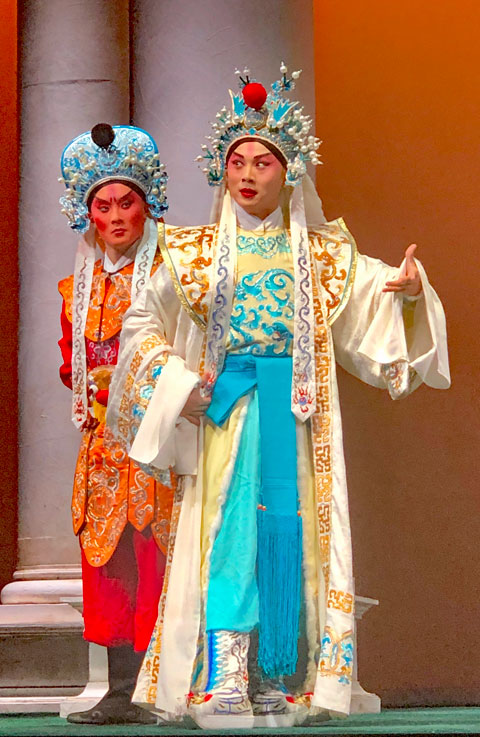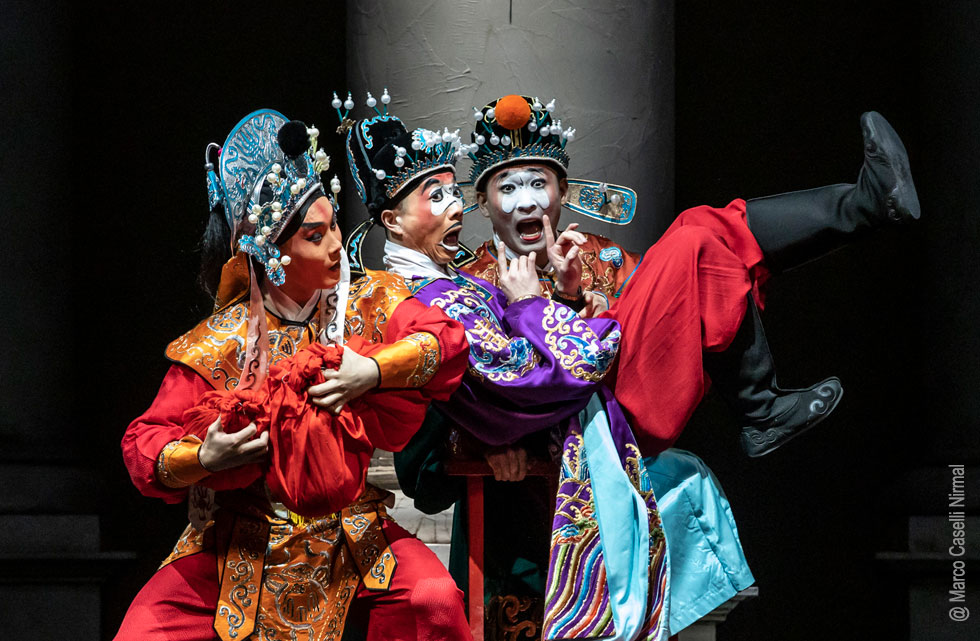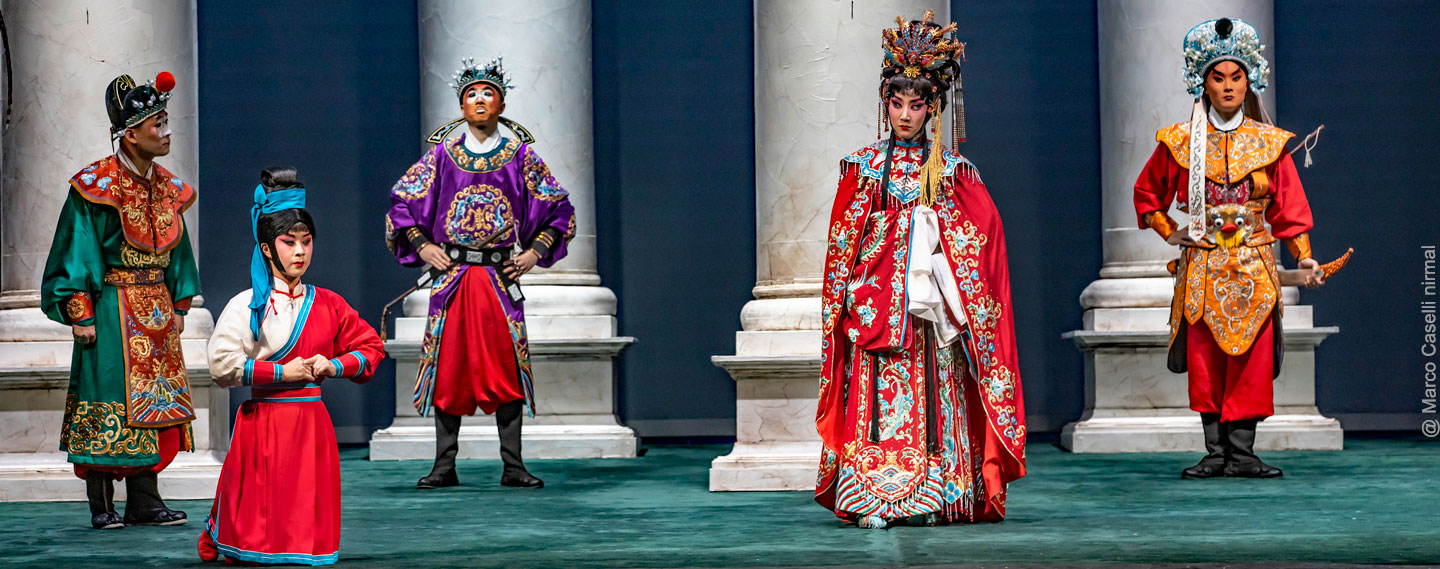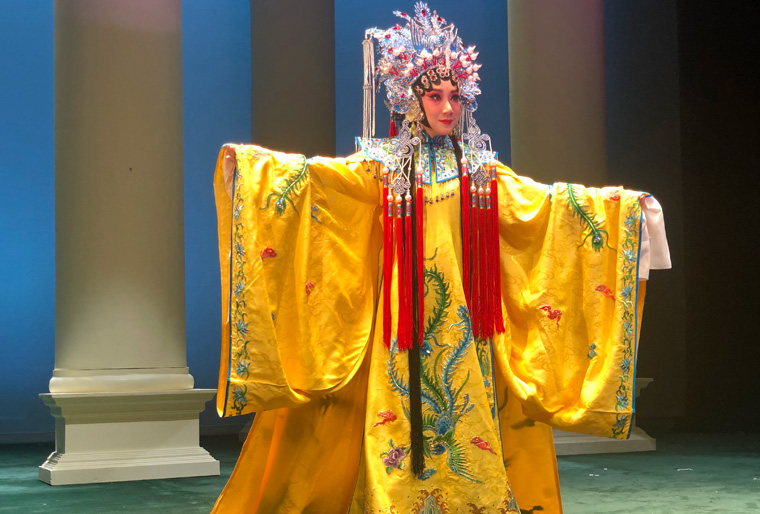TURANDOT
music Luigi Ceccarelli, Alessandro Cipriani and Qiu Xiaobo
direction Marco Plini
direction for Beijing opera Xu Mengke
dramaturgy Wu Jiang e Wu Yuejia
assistant director Thea Dellavalle
costumes Jiang Dian
coreography Cao Yang
lighting design Tommaso Checcucci
video Orlando Bolognesi
hairstyling and makeup Zheng Weiling
with the actors of National Beijing Opera Theatre Company
Zhang Jiachun, Turandot – Xu Mengke, Calaf – Wu Tong, Liù – Liu Dake, Timur – Ma Lei, emperor Wang Ping – Wang Chao, Ping – Nan Zikang, Pong – Weng Pengyu, Pang
musicians
Vincenzo Core, electric guitar and electronics – Giacomo Piermatti, double bass – Meng Lingshen, jing hu – Zhang Fuqi, jing er hu – Li Lijing, yue qin
percussions: Laura Mancini, bass drum, vibraphone, rototom – Wang Xi, ban gu e da tang gu – Cao Rongping, nao bo – Chen Shumin, xiao luo – Niu Lulu, da luo
costums Jiang Dian
choreography Cao Yang
light designer Tommaso Checcucci
video Orlando Bolognasi
hairstyle and makeup Zheng Weiling
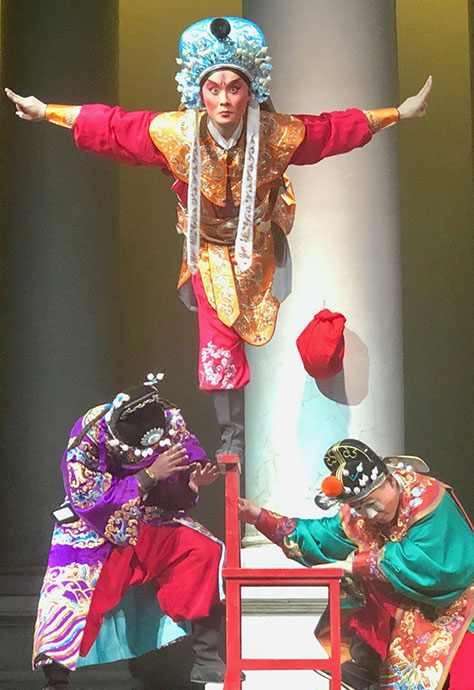
technical manager Robert John Resteghini,
stage manager Gioacchino Gramolini,
machinist Riccardo Betti,
head electrician Tommaso Checcucci,
head audio technician Alberto Tranchida,
audio technician Filippo Cassani,
video technician Orlando Bolognesi,
tailor and stagehand Lucia Bramati,
translators Wen Yan e Zhou Quan
collaborator to the scenes project Marco Fieni,
scenes built in the laboratory of Emilia Romagna Teatro Fondazione,
head constructor Gioacchino Gramolini,
builders Riccardo Betti e Marco Fieni,
scenes decorators Lucia Bramati e Francesca di Serio
produced by China National Peking Opera Company,
Emilia Romagna Teatro, Teatro Metastasio di Prato
representations
December 21, 2018, Beijing (Cina), Tsinghua University, Meng Minwei Concert Hall
January 10-13, 2019, Bolzano, Teatro Stabile di Bolzano
January 17-20, 2019, Prato, Teatro Metastasio
January 23-27, 2019, Modena, Teatro Storchi
January 29, 2019, Ferrara, Teatro Comunale
February 1st, 2019, Casalmaggiore, Teatro Comunale
February 5-10, Roma, Teatro Argentina
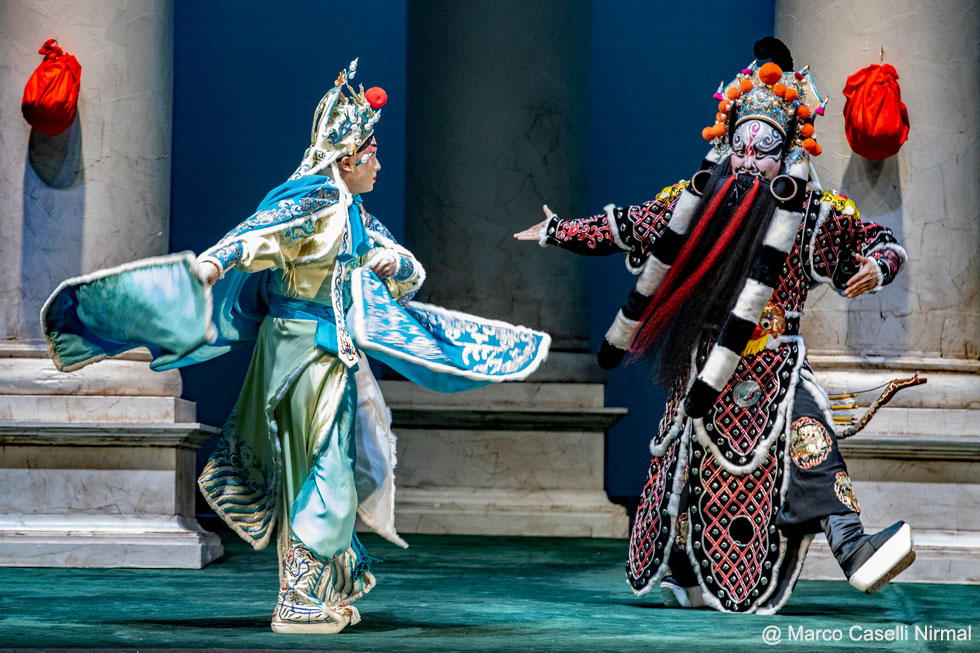

It may appear like a big challenge, at first, to write new music for Turandot. This work is very far from the famous opera by Puccini. Here we are in China, the true China, not the told or dreamed about. Only one part of the story (which stems from the Persian medieval time) has some similarity with that opera. The music, the text, the acting, the storytelling, the setting are totally different. Our goal as composers in this work was that of tackling the ancient tradition of Beijing Opera, with its actors and musicians, and also with its musical tradition. The music of Chinese opera shows unexpected rhythmical variations in relationship with the movements and phrasing of the actors, and there is no relationship whatsoever with Italian opera in many senses.
Turandot music is an encounter between Chinese opera traditional melodies elaborated and sometimes reinvented by Chinese composer Qiu Xiaobo, and original music created by two Italian composers. We created a second sound and music layer, parallel but also integrated with Chinese music and acting. We also expanded electronically the Chinese acoustic timbres; our live and recorded processing of their instruments became a bridge between the Italian instruments (double bass, electric guitar and percussions) and the Chinese ones (also string instruments and percussions). The electronics part is like a magnifying lens which leads us to listen to that instrumental music in a different way, and it plays the role of a bridge between the two musical cultures. It also expands the sound onto a multidimensional space, which evolves together with the story, and it becomes the immersive acoustic space of the storytelling.
(Alessandro Cipriani and Luigi Ceccarelli)
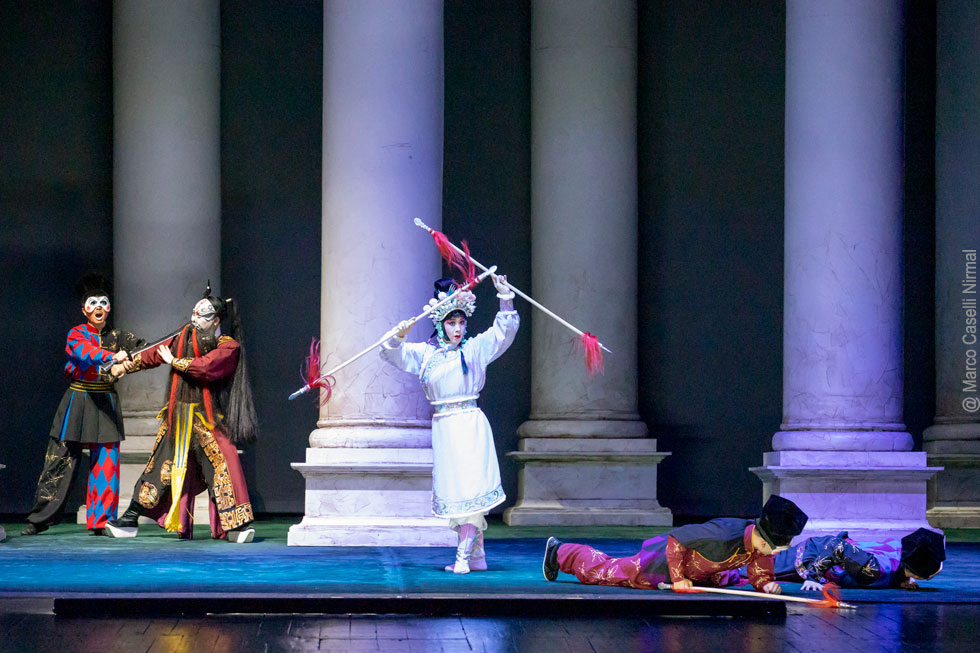
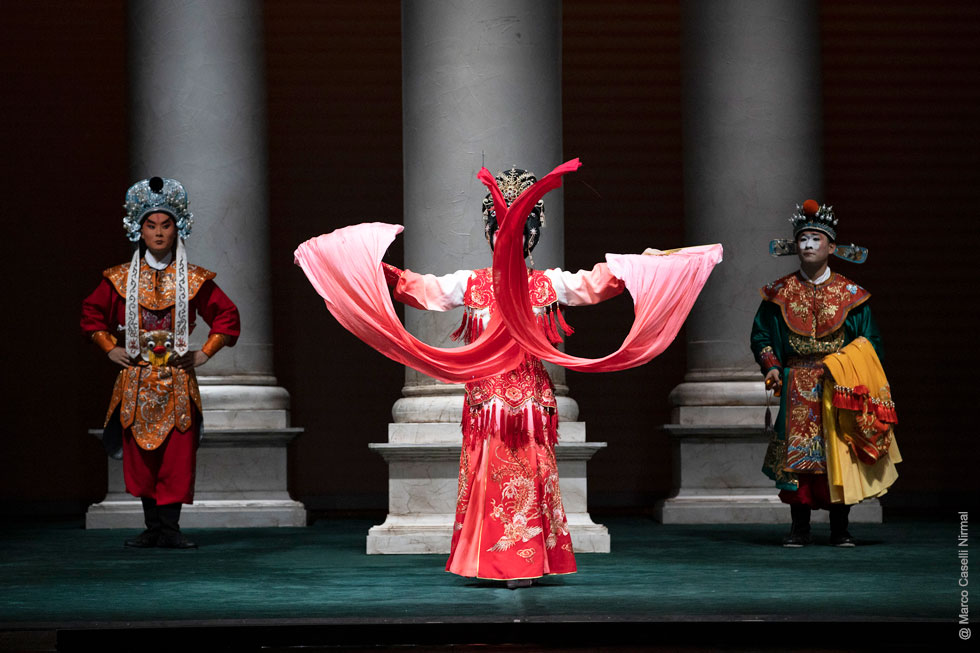

Review
TURANDOT, COME AWAY WITH ME
I went to China last night. I got the ticket to go there at the theater, in Piazza Verdi in Bolzano. Shortly after I was already there. I just had to take a seat in the same theater and I had China in front of me and around it. No, not China of GDP, Gross Domestic Product, the one that produces all the producible. On stage, and sometimes off stage, there was the ancient, deep, archaic, perhaps timeless one. It was all
inside a “Turandot” never seen and never heard, rewritten and re-musiced, recited-sung in Chinese, surtitled in Italian, immersed in electronic and traditional sounds. A journey through time and space, for the spectators. When you arrive in a foreign country, but really foreign, whose language you don’t know, they say that the first thing to do is to listen and look. And take the time not to understand. Gradually, the tones, movements and rhythms of others become less alien: at the beginning the first defense is a smile, to protect you from the exotic in front of you, almost a gesture of superior benevolence. But then you understand that that exotic is not a fake folklore, but a secular and serious reality, which offers us a world that perhaps we will never master (let alone learn it in an 80-minute show),
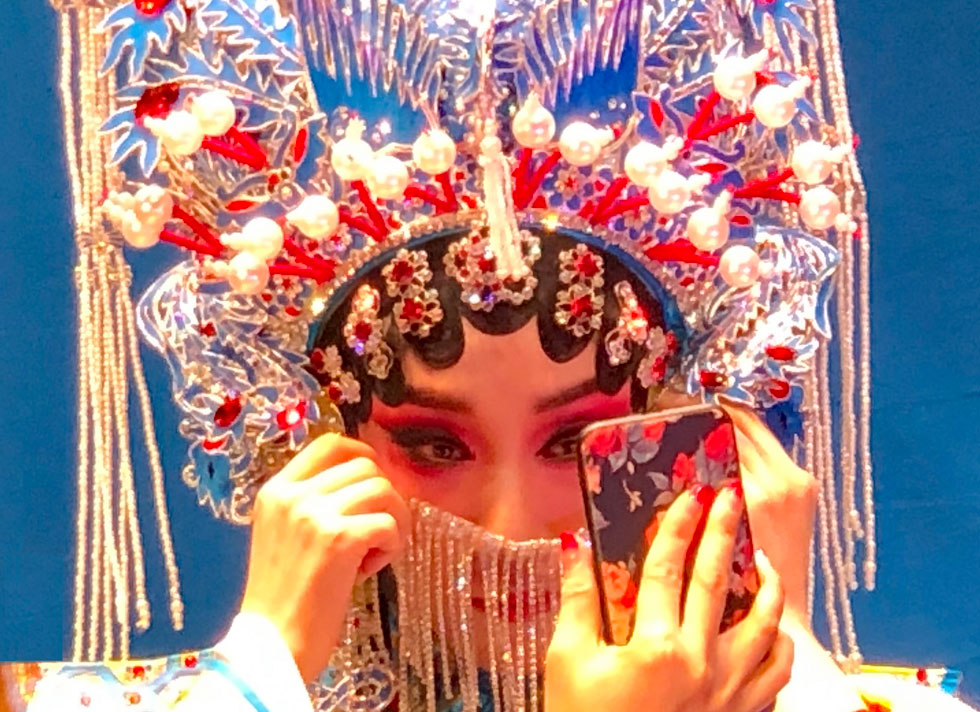
but that will host us with great dedication throughout the evening.
Here, perhaps the thing that most enchants about this Sino-Italic Turandot is that in the end you realize that yes, it’s true, in these days we are hosting the National Opera Company of Peking in the season of the Bolzano Stable, but in that hour and a half we are the guests there. Because suddenly we forget Bolzano, piazza Verdi, the new year 2019, and we are moved into a fairy tale told in a language we do not understand, with gestures we are not used to, by actors who we guess are very good but we do not know why, in vocal tones strangle me yet never out of place, with bright and elegant colors, in a mixture of ancient and contemporary sounds: and we discover that we find ourselves magnificently at ease. A hypnotic, fun and successful journey. We can only witness that strange wonder with amazement, like children for the first time. Let’s let go of our moorings, let’s not look for Puccini, let’s not cling to the libretto that we may have in mind, and let’s enjoy the fairy tale. In this version, the Calaf who solves the cruel princess Turandot’s enigmas is a giant: brazen, naive, brilliant and clear in feelings, loyal. We are all for him. Turandot repents, but the happy ending in black fairy tales is not right to look for it. And there is also a moral: you cannot overlook everything. This reinvention of the Turandot reminds me of the respect with which today’s restorers recover ancient works of art: they work best to bring out the age, the distance from us. The otherness that makes them precious. To highlight the ancient patina that constitutes the fiber. This is why every movement on the stage has its outdated measure. For this each step is calculated. Each consistent stunt. It is a perfect opportunity, this evening at the theater, to live the absurd experience of not understanding a single word (except perhaps TURANDOT – let’s see if you identify it when it is pronounced!) Without feeling excluded from the party.
Paolo Mazzucato (Alto Adige, Lettere e Commenti, 12/01/19)
